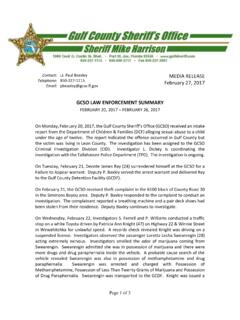Transcription of The Office of The Virginia Magistrate - bvso.net
1 THE Office OF THE Virginia Magistrate History and Purpose The Office of the Magistrate traces its development through centuries of English and American history. Many of the duties now performed by magistrates were one carried out by justices of the peace. However, the Office of justice of the peace was phased out in 1974, and the Virginia Magistrate system was established as part of a statewide court reorganization plan. While magistrates are not judges possessing trial jurisdiction, they are an integral part of the judicial system and are judicial officers of the Commonwealth of Virginia . The principal function of the Magistrate is to provide an independent, unbiased review of complaints brought to the Office by police officers, sheriffs, deputies, and citizens. Magistrates are not police officers nor are they in any way connected with law enforcement.
2 Instead, magistrates are issuing officers who serve as a buffer between law enforcement and society. Most magistrates are not lawyers; however, they are specially trained to perform such duties as issuing search warrants, subpoenas, arrest warrants, summonses, and setting bail. In addition, magistrates may assist the public by providing information on the judicial system processes and procedures. Appointment, Operation, and Jurisdiction While justices of the peace were generally elected officials, the only method of selection of a Magistrate is by appointment. Chief circuit court judges are responsible for appointing magistrates who serve for four year terms and may be reappointed. Any persons who are United States citizens and residents of the judicial district for which they are seeking appointment are eligible to become magistrates unless precluded from appointment because of a statutory conflict of interest such as having a spouse who is a law enforcement officer.
3 When magistrates are appointed for a judicial district, at least one must be appointed for, and reside in, each city and county in the district. The number of magistrates in each district is authorized by the Committee on District courts and must be sufficient for the effective administration of justice. The chief circuit court judge has full supervisory authority over magistrates but may delegate this authority over magistrates but may delegate this authority to the chief general district court judge. Each district has a chief Magistrate who exercises direct daily supervision over the Magistrate within the district. The large urban areas generally utilize fulltime magistrates who work on a shift basis to maintain an open Office twenty-four hours a day. In contrast, the majority of rural magistrates work on an availability basis and are contacted as needed by citizens or law enforcement officers.
4 In some areas, magistrates work a fixed schedule during the day and are on call during night hours. Magistrates have no power to take any action unless authority has been expressly conferred by statute. Magistrates have the following powers: To issue arrest warrants. To issue search warrants. To admit to bail or commit to jail . To issue warrants and subpoenas. To issue civil warrants. To administer oaths and take acknowledgements. To act as conservator of the peace. To accept prepayment for traffic and certain minor misdemeanor offenses. To issue temporary detention orders. As a general rule, magistrates may exercise their authority only within the borders of their judicial district. Responsibilities of the Magistrate To appreciate the role of a Magistrate in the judicial process, it is necessary to understand how magistrates perform their basic duties. To issue arrest warrants.
5 Before magistrates can issue an arrest warrant in a criminal case, they must use their discretion to decide if there is probable cause to issue a process. Probable cause is a reasonable belief, based on facts, that would cause a prudent person to feel that the accused committed the offense. To determine probable cause, magistrates must decide that there are facts logically indicating that the accused committed an offense and there must be some basis for determining that the fact are reliable. The facts are obtained from the complaint which consists of sworn statements of a citizen or a law enforcement officer relating to the commission of an alleged offense. These statements are made under oath before a Magistrate , and the Magistrate may require the sworn statements to be reduced to writing and signed. If the Magistrate decides that probable cause exists, an arrest warrant will be issued so that the accused may be brought to trial.
6 To issue search warrants. When magistrates issue a search warrant , they are giving a law enforcement officer authority to conduct a search to aid an official investigation. The officer seeking the search warrant must make a complaint, under oath, stating the purpose of the search to the Magistrate . The complaint must be supported by a written affidavit from the officer. In issuing the search warrant , the Magistrate must describe the place to be searched, the property or person to be searched for, and state that the Magistrate has found probable cause to believe that the property or person constitutes evidence of a crime or tends to show that a person has committed a crime. To admit to bail or commit to jail . Bail procedures exist to enable an accused to stay out of jail and to insure that the accused will appear for trial. Magistrates decide the terms of bail by examining certain facts about the accused such as the nature and circumstances of the offense charged, the accused s family ties, employment, financial resources, length of residence in the community and past record.
7 If possible, the Magistrate will release the accused on a written promise to appear in court with or without an unsecured bail bond. If, after examination of these facts, magistrates are not reasonably sure that the accused will appear for trial, the magistrates, in their discretion, will require the execution of a bail bond with surety in a reasonable amount and may impose such other conditions deemed reasonably necessary to insure appearance at trial. The monetary sum of the bail bond can be forfeited as a penalty if the accused fails to appear in court or violates any condition of bail. To issue warrants and subpoenas. In addition to arrest warrants, magistrates also have authority to issue summonses. A summons notifies a person that an action has been brought against him or her and the he or she is required to answer to it at a time and place named in the summons. A summons is normally issued when the individual is charged with a minor offense and the Magistrate believes that the individual will appear in court on the basis of the written promise to appear on the summons.
8 A subpoena is issued by a Magistrate to notify witnesses that they must appear in court and give testimony at a time and court named in the subpoena. Failure to appear may be considered as contempt of court which is punishable by a fine or imprisonment. To issue civil warrants. Civil cases involve disputes among individuals, corporations, or groups of individuals. The remedy sought normally is to recover money damages or to require a person to complete an agreement or refrain from some activity. Magistrates are authorized by statute to issue civil processes such as civil warrants to collect money owed on unpaid rent; however, most of these matters are handled through the general district court clerk s Office . For further information regarding the issuance of these processes, please contact that court. To accept prepayment for certain offenses. Magistrates are given the authority to accept prepayments for certain traffic and minor misdemeanor violations such as speeding and unlawful swearing and cursing.
9 Where prepayment is allowed, the accused may plead guilty, give up the right to a court hearing, and pay an established fine and court cost through the Magistrate . Prepayments made to magistrates must be made in person before the Magistrate ; however, the individual may call the Magistrate in advance to determine the exact amount of the prepayment. To issue temporary detention orders. Magistrates, along with judges and special justices, have authority to issue order of temporary detention for persons reliably reported to be mentally ill and in need of hospitalization. The criteria for the issuance of a detention order by a Magistrate is stricter than for a judge or special justice. Before magistrates may issue detention orders, they must have received advice from a person skilled in the diagnosis or treatment of mental illness. Such person may be a psychiatrist, mental health professional, or a medical doctor.
10 The name of such person must be listed on the detention order by the Magistrate . Under Virginia law, mentally ill is defined to include persons afflicted with mental disease to the extent that for their own welfare or the welfare of others, they require case and treatment. Drug addiction and alcoholism are also included in the definition of mental illness. Legal Advice Magistrates will try to assist you by providing general information, but they are generally not attorneys and cannot give legal advice. If you wish to retain your own attorney and or obtain legal advice but do not know an attorney, you may obtain the name and telephone number of a local attorney from the Virginia State Bar Referral Service by calling the following toll-free number: 800-552-7977.








